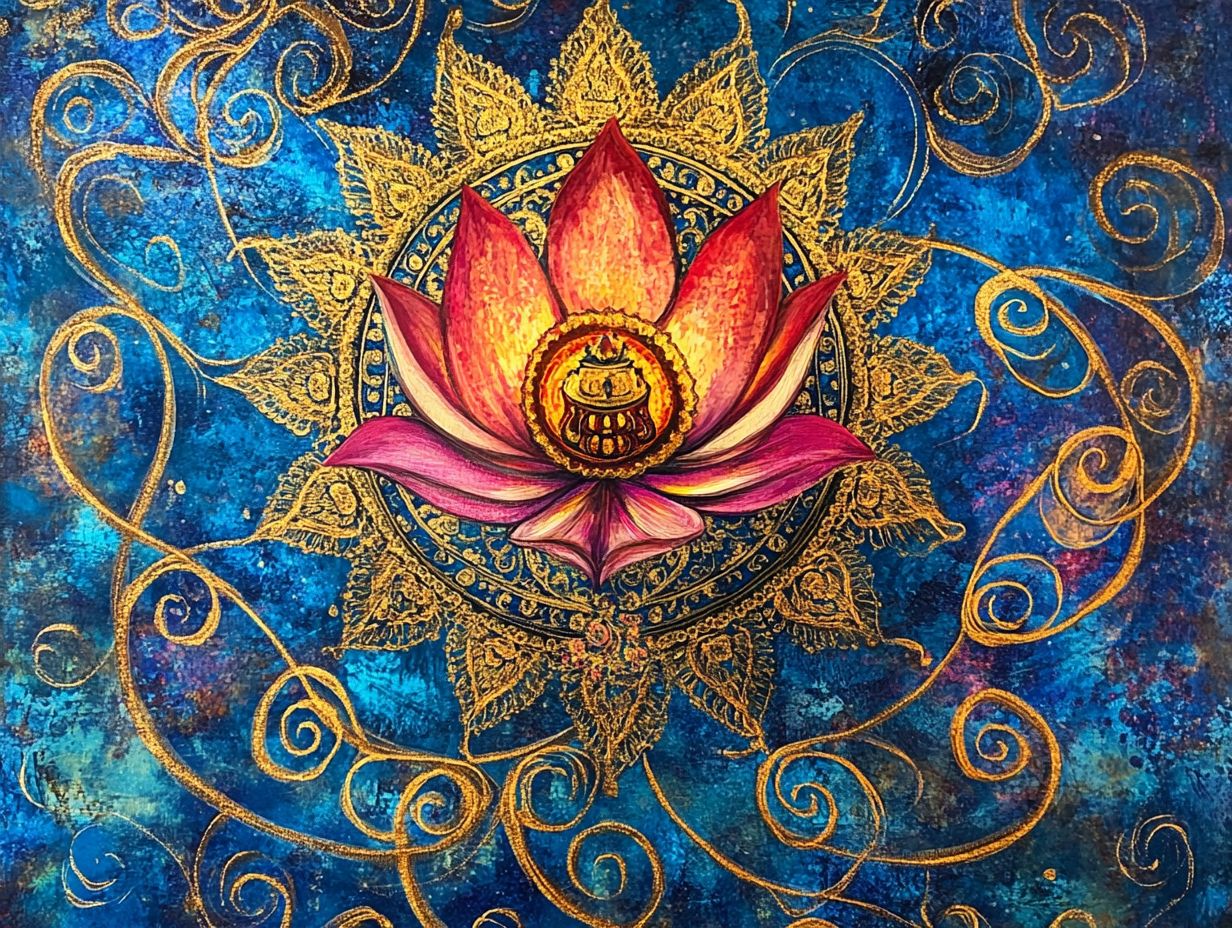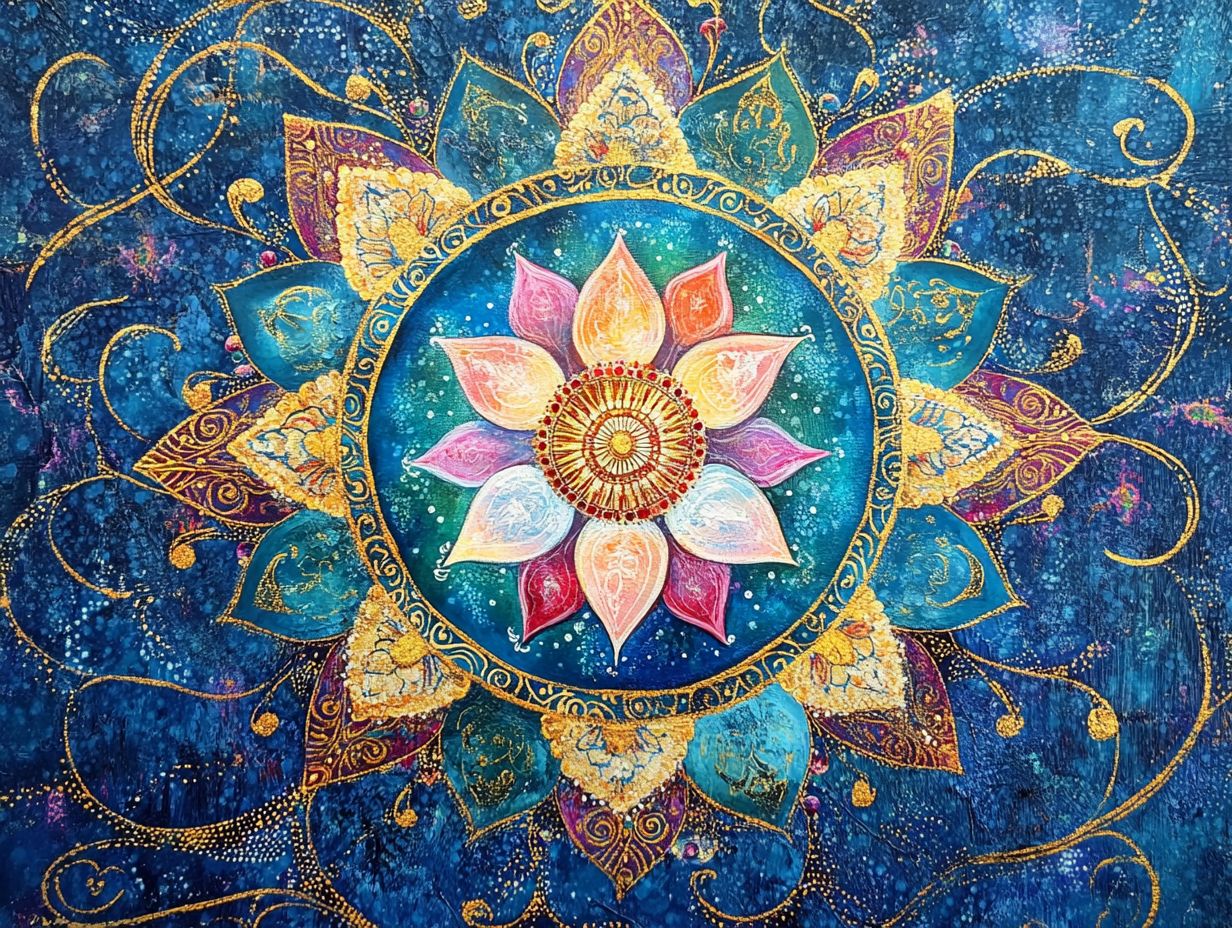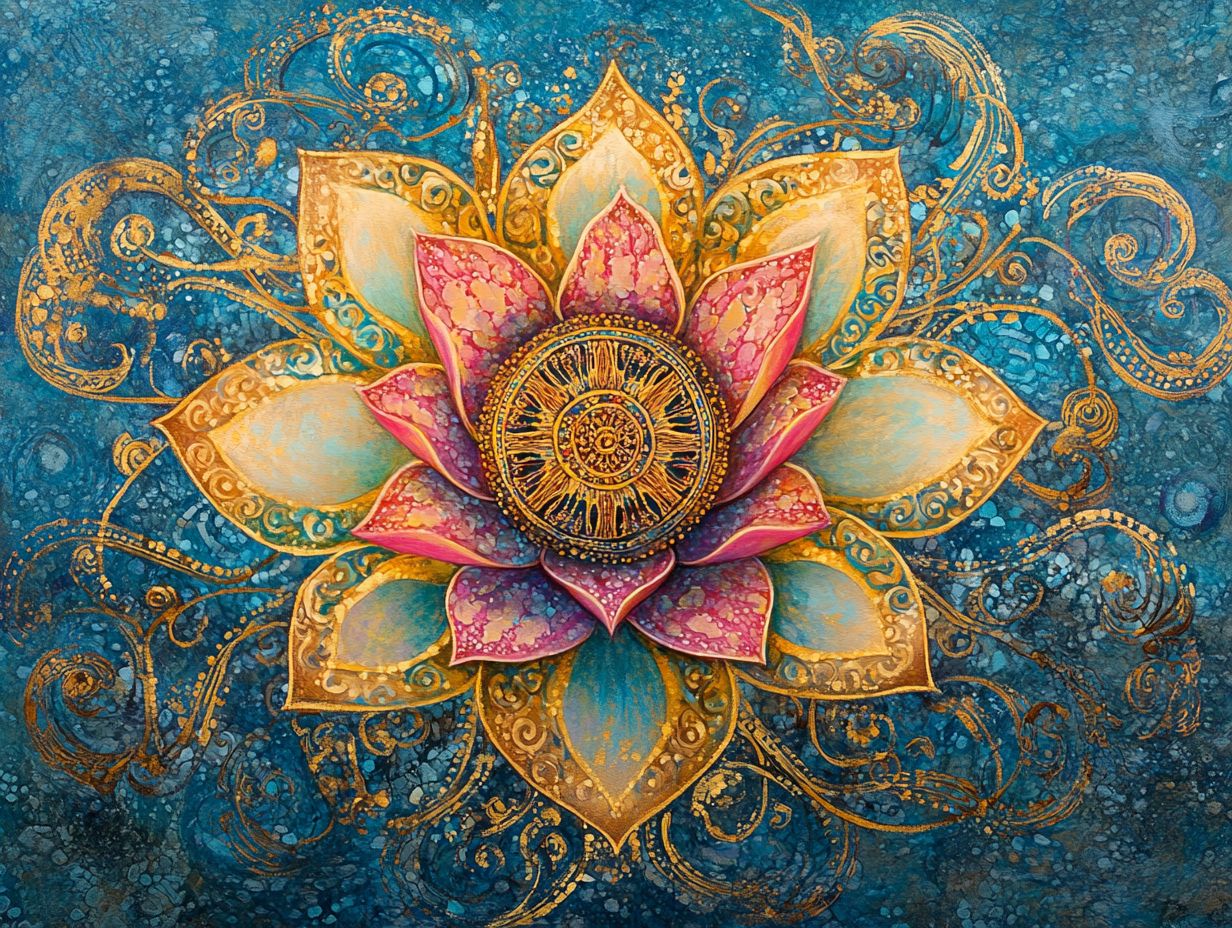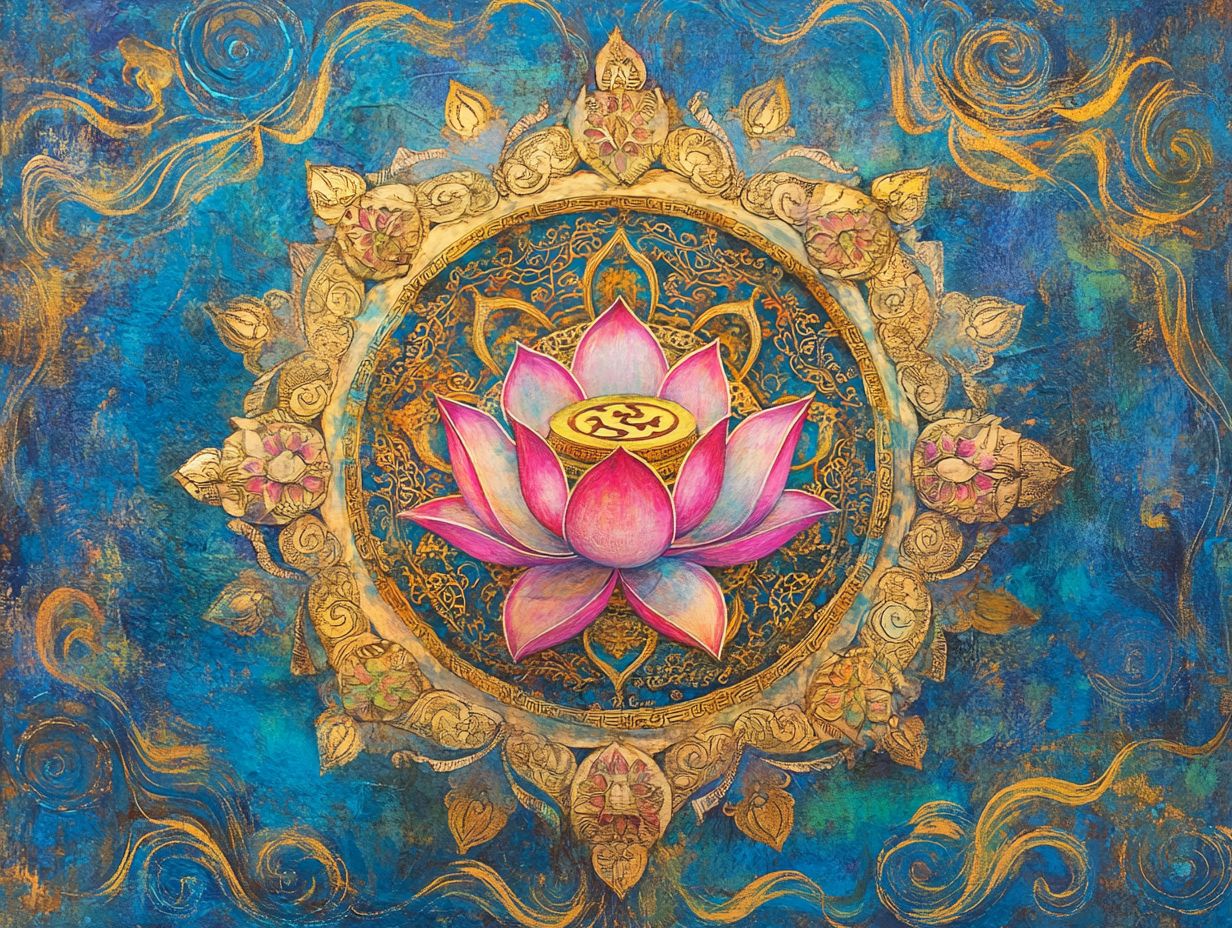How Do Karma and Reincarnation Relate to Hinduism and Buddhism?
Karma and reincarnation are intricately linked concepts that profoundly influence the philosophies of both Hinduism and Buddhism. The understanding of karma transcends the simple notion of cause and effect; it weaves together a complex tapestry of beliefs that shape actions and their repercussions in this life and beyond. These beliefs are deeply embedded in Hindu cosmology and Buddhist cosmology, impacting how adherents perceive their existential journey.
This exploration delves into the three distinct types of karma, highlighting its significance within Hindu and Buddhist practices. It also examines how these philosophies interpret reincarnation and the quest for liberation.
Through this existential journey, one can unravel the profound teachings of these traditions and their implications for spiritual growth and self-realization.
What is Karma and Dharma?

Karma serves as a foundational concept across numerous spiritual traditions, particularly within Hinduism and Buddhism. It represents the law of moral causation, wherein an individual’s actions shape their future experiences and influence spiritual growth and the karmic balance in their existential journey.
This principle carries significant ethical implications, positing that virtuous deeds cultivate positive karma, while detrimental actions yield negative karma, impacting the soul’s journey through the cyclical process of rebirth known as samsara.
A comprehensive understanding of karma paves the way toward enlightenment and spiritual liberation, ultimately guiding individuals toward the divine justice and cosmic balance that underpin existence, as described in spiritual teachings and sacred texts like the Vedas and Pali Canon.
What are the Three Types of Karma?
The three types of karma sanchita, prarabdha, and agami are essential for grasping the intricate implications of karma on an individual’s spiritual evolution, cycles of rebirth, and the journey through various life cycles.
Sanchita karma embodies the accumulation of actions from all past lives, creating a reservoir filled with both positive and negative deeds. This collective karma plays a pivotal role in shaping future experiences and realities, acting as the foundation upon which one’s current life is built.
Conversely, prarabdha karma refers specifically to those karmic actions that are poised to manifest in the present lifetime. It serves as a guiding force, dictating the circumstances and challenges that an individual will encounter along their spiritual cycle and existential journey.
Agami karma, on the other hand, consists of the actions generated by one s current life, influencing experiences that extend beyond the present existence and into future reincarnation cycles.
Together, these types of karma weave a complex tapestry that not only impacts the cycle of rebirth but also informs spiritual practices in Hinduism and Buddhism. By understanding these karmic mechanisms, practitioners are encouraged to cultivate mindfulness and ethical living, fostering positive consequences in their lives.
How Does Karma Relate to Hinduism?
In Hinduism, the concept of karma is intricately woven into the fabric of its spiritual teachings, positing that every action undertaken by an individual plays a crucial role in shaping their destiny and life after death. This connection between karma and the principles of dharma and moksha is profound.
Ethical conduct serves as the determining factor for one s karma; virtuous actions yield positive outcomes and pave the way to spiritual liberation, while harmful behaviors generate karmic debt that necessitates resolution through future incarnations within the cycle of rebirth.
What is the Concept of Karma in Hinduism?
The concept of karma in Hinduism is intricately tied to the belief in the karmic cycle, wherein individual actions shape not only their present lives but also dictate their future incarnations within the ongoing process of reincarnation. This cycle illustrates that every thought, word, and deed contributes to an individual’s karmic record, profoundly influencing their spiritual trajectory and spiritual awareness.
For instance, acts of kindness, such as aiding those in need, are believed to generate positive karma, potentially leading to more favorable circumstances in future existences. In stark contrast, negative actions, like deceit or harm, may result in obstacles or suffering in subsequent incarnations. Such beliefs inspire practitioners to embrace ethical behavior and pursue spiritual growth, cultivating an awareness of how daily interactions resonate with one’s long-term soul journey.
In this way, karma emerges as a guiding principle for ethical living, highlighting the interconnectedness of all beings and the continuous evolution of the soul.
What Role Does Karma Play in Hindu Beliefs?
Karma holds a central position in Hindu beliefs, serving as a guiding principle that shapes ethical conduct and personal responsibility. In this framework, every action is viewed as an expression of moral choice, with corresponding effects of karma that ensure the presence of divine justice and cosmic justice.
This intricate concept not only serves as a reminder of the consequences of one s actions but also provides a means to navigate the complexities of moral dilemmas encountered in everyday life. In this manner, karma is closely aligned with the notions of dharma, or duty, encouraging individuals to act with integrity and mindfulness.
It underscores the understanding that spiritual growth is intrinsically linked to the cumulative impact of one’s choices, highlighting the interconnectedness of all beings within the grand cosmic order. As a result, followers recognize that their ethical decisions reverberate beyond the immediate, contributing to a universal balance that reflects the principles of divine law.
How Does Karma Relate to Buddhism and the Eightfold Path?
In Buddhism, karma stands as a fundamental principle that forms the backbone of its teachings, highlighting the intricate web of actions and their consequences. This doctrine illustrates how one’s deeds influence their journey toward enlightenment, as elucidated in the Four Noble Truths and the Eightfold Path.
What is the Concept of Karma in Buddhism?

The concept of karma in Buddhism is defined by the understanding that intentional actions yield moral consequences, which forms the foundation for karma analysis as practitioners seek to cultivate ethical behavior that supports their spiritual growth and ethical principles in Buddhism.
This intricate relationship highlights the significance of how one’s thoughts and actions resonate throughout the cycles of existence. As individuals delve into these dynamics, they become increasingly cognizant of the profound implications their choices carry, not only for their personal journeys but also for the collective well-being of all.
Meditation and mindfulness emerge as potent tools in this transformative process, allowing practitioners to elevate their consciousness. Through fostering deeper awareness, they learn to navigate the complexities of their actions and nurture wholesome intentions, drawing ever closer to the transcendent state of nirvana.
Ultimately, this journey centers on a steadfast commitment to ethical living, which enriches both one’s karma and spiritual awakening, as described in Buddhist teachings and the Eightfold Path.
How Does Karma Influence the Cycle of Rebirth in Buddhism?
Karma plays a pivotal role in the cycle of rebirth within Buddhism, where the accumulation of karmic consequences from one’s actions dictates the conditions and circumstances of future existences. This underscores the significance of spiritual responsibility and non-attachment in alleviating suffering.
The intricate relationship between an individual’s actions and their repercussions not only shapes future lives but also invites a more profound understanding of compassion. By recognizing the mechanics of karma, individuals are inspired to cultivate non-attachment, enabling them to act from a foundation of love and kindness rather than from a desire for personal gain. This fosters a deeper connection to the collective well-being of all beings.
Such awareness can nurture a steadfast commitment to ethical behavior, creating a cycle that mitigates suffering for both oneself and others. Ultimately, the pursuit of enlightenment emerges as a pathway to transcend the unending cycle of rebirth, guiding individuals toward a state of liberation and profound peace.
What is Reincarnation?
Reincarnation, a foundational tenet in both Hinduism and Buddhism, embodies the cyclical journey of birth and rebirth. In this intricate process, the soul (atman) transitions from one life to another, influenced by the accumulated karma derived from past existences.
What is the Belief of Reincarnation in Hinduism?
In Hinduism, the belief in reincarnation is profoundly intertwined with the understanding that the soul’s journey through multiple lives is shaped by karma, ultimately aspiring for liberation from the cycle of samsara and reunification with the divine. This intricate cycle of birth, death, and rebirth embodies the continuity of the soul, which undergoes growth and transformation with each new incarnation. This belief is prominently explored in Hindu scriptures like the Upanishads and Vedas.
The principles of karma assert that actions taken in one life bear significant consequences in subsequent existences, influencing the experiences and lessons that unfold. Key philosophical texts, such as the Upanishads, explore these concepts in depth, providing profound insights into the nature of reality, the self, and the ultimate aspiration of achieving moksha, or liberation.
By engaging with these teachings, individuals are inspired to live righteously, fostering the hope of progressing toward a state of eternal peace and enlightenment.
What is the Belief of Reincarnation in Buddhism and the Pali Canon?
The belief in reincarnation within Buddhism is rooted in the idea that beings find themselves ensnared in an unending cycle of samsara, birth, and rebirth, where their actions known as karma play a pivotal role in determining the nature of each cycle and the experiences encountered in life. This idea is also present in Hinduism, emphasizing the spiritual cycle of life and death.
This intricate relationship between karma and rebirth posits that every thought, word, and deed carries significant weight, influencing not only one’s present circumstances but also future incarnations and the karmic balance of one’s soul journey.
Ethical behavior thus emerges as a cornerstone of this philosophical framework, highlighting the paramount importance of compassion, kindness, and moral integrity. Through the cultivation of positive actions, known as moral deeds, individuals can generate beneficial karma that paves the way for a more favorable rebirth and spiritual evolution.
Spiritual practices such as meditation, mindfulness, and ethical conduct are viewed as critical instruments for transcending the cycles of suffering, skillfully guiding practitioners toward enlightenment and spiritual liberation.
Ultimately, grasping this complex interplay gives individuals the power to embrace responsibility for their actions and aspire to liberate themselves from samsara, the relentless cycle of birth and death, thus achieving spiritual liberation.
How Do Karma and Reincarnation Interact in Hinduism and Buddhism?
The concepts of karma and reincarnation are intrinsic to the spiritual philosophies of Hinduism and Buddhism, deeply influencing their respective teaching and practices.
The interplay of karma and reincarnation within Hinduism and Buddhism unveils deep insights into the nature of spiritual evolution and the karmic cycle. It illustrates how an individual’s actions not only influence their present life but also dictate the path of their future existences.
How Does Karma Affect Reincarnation in Hinduism and Buddhism?

Karma plays a crucial role in shaping reincarnation within both Hinduism and Buddhism, where the karmic cycle intricately guides the soul’s journey through various lifetimes, influenced by the moral quality of actions taken and the cosmic justice reflected through karmic balance.
In Hinduism, for instance, a soul that amasses good karma through selfless acts, known as karma yoga, may find itself reborn into a higher caste or a more favorable existence, while negative actions could lead to a more arduous life in the next incarnation.
Similarly, Buddhism places significant emphasis on the intention behind actions, suggesting that mindful deeds enhance one’s karmic reserves and influence their spiritual growth. The ethical implications are profound; individuals must reflect on how their choices impact not only their own futures but also the broader tapestry of existence.
Furthermore, engaging in spiritual practices, such as meditation, can significantly influence one’s karma. By fostering mindfulness and compassion, practitioners are equipped to mitigate negative karma and pave a more enlightened path for their soul’s evolution, thus achieving spiritual awakening.
What is the Ultimate Goal of Karma and Reincarnation in Hinduism and Buddhism?
The ultimate aim of karma and reincarnation within Hinduism and Buddhism is the attainment of spiritual liberation referred to as moksha in Hinduism and nirvana in Buddhism. This liberation signifies the soul’s transcendence beyond the confines of the material world and the perpetual cycles of rebirth, often referred to as the spiritual realm.
Such liberation embodies a profound inner peace, marking a return to ultimate reality, liberated from suffering and ignorance, concepts central to both Hindu and Buddhist cosmology.
Both traditions underscore the significance of ethical living and spiritual awareness as the cornerstone of this transformative journey. In Hinduism, adherence to dharma serves as a guiding principle for actions aligned with the universe, while Buddhism advocates for right conduct and non-attachment as integral components of the Noble Eightfold Path.
Sacred scriptures, including the Bhagavad Gita, the Vedas, the Upanishads, and the Dhammapada, illuminate the roles of meditation and self-realization as vital practices for cultivating awareness and compassion.
Ultimately, these spiritual disciplines facilitate a deeper comprehension of the self and nurture a meaningful connection to the vast cosmos, underscoring the interconnection of life and the duality of existence.
How Do Hinduism and Buddhism View the Concept of Liberation from Karma and Reincarnation?
Hinduism and Buddhism regard liberation from karma and reincarnation as essential elements of their spiritual doctrines. Both traditions underscore the importance of ethical conduct, meditation, and adherence to divine law as pathways to enlightenment and ultimate release from the cycles of rebirth.
What is Moksha in Hinduism?
Moksha in Hinduism represents the ultimate state of liberation from the relentless cycle of samsara, wherein the soul attains spiritual freedom from karma and merges with divine consciousness, as described in Hindu scriptures.
This profound concept is intricately connected to the beliefs surrounding karma, underscoring the idea that every action taken throughout life resonates through the soul s journey. Achieving moksha transcends being a mere end goal; it encompasses a transformative process that encourages individuals to partake in selfless deeds, meditate, and cultivate wisdom and compassion.
Practices such as yoga, devotion (bhakti), and knowledge (jnana) emerge as essential pathways guiding adherents toward this spiritual aspiration, as outlined in the karma theory.
Ultimately, the interplay of one s karma and dharma shapes the journey, as positive actions can lead to the purification of the soul, paving the way for the long-sought liberation from earthly attachments and the blissful union with the supreme reality.
What is Nirvana in Buddhism?
In Buddhism, nirvana epitomizes the ultimate aspiration of spiritual awakening, where one transcends the relentless cycle of rebirth, liberating oneself from suffering and extinguishing desires and attachments, thereby breaking free from the karmic cycle and achieving liberation from rebirth.
For practitioners, attaining this state is of paramount significance, as it symbolizes not merely personal liberation, but a deep and profound understanding of the very fabric of reality, as taught in Buddhist teachings.
The journey toward nirvana is marked by rigorous self-discipline, meditation practices, and an unwavering commitment to ethical living, all of which serve to cultivate mindfulness and compassion.
It is imperative to note that nirvana stands apart from the Hindu notion of moksha, which is more closely aligned with union with the divine and is deeply rooted in Hindu cosmology.
A nuanced understanding of karma is essential on this path, as individuals must acknowledge the ramifications of their actions and how these contribute to their spiritual evolution.
Through continuous self-reflection and personal growth, practitioners gradually draw nearer to this transformative state of peace and enlightenment, reflecting the existential journey of the soul.
Frequently Asked Questions
1. How do karma and reincarnation relate to Hinduism and Buddhism?

In both traditions, these concepts form the bedrock of their spiritual philosophy.
In Hinduism and Buddhism, karma is the concept of cause and effect, where one’s actions and intentions determine their future experiences and life cycles.
Reincarnation, on the other hand, is the belief that after death, the soul is reborn into a new body. These two concepts are closely related in the sense that one’s karma in their current life will determine their future rebirth and experiences.
2. Do Hinduism and Buddhism have different beliefs about karma and reincarnation?
The reincarnation beliefs differ in nuances but share a common thread.
While both religions believe in the concepts of karma and reincarnation, they have different interpretations and practices, particularly in their ethical principles.
In Hinduism, karma is seen as a means to reach moksha, or liberation from the cycle of rebirth, while in Buddhism, it is seen as a way to break the cycle of suffering and attain enlightenment.
3. How does the law of karma differ in Hinduism and Buddhism?
These differences are reflected in their spiritual teachings and practices.
In Hinduism, the law of karma is based on the principle of dharma, or duty and righteous action, while in Buddhism, it is based on the Four Noble Truths and the Eightfold Path. This means that the intentions and actions that lead to good karma may differ between the two religions, impacting karma in daily life and their existential suffering.
4. Can one’s karma in a past life affect their reincarnation in the next life?
This is a core tenet of both karma and reincarnation in Eastern religions.
Yes, both Hinduism and Buddhism believe that one’s actions in a past life can affect their karma and reincarnation in the next life, reinforcing the idea of spiritual growth through existential journey.
This is why it is important to cultivate good karma through positive actions and intentions in order to have a better rebirth.
5. Is the concept of karma and reincarnation unique to Hinduism and Buddhism?
These concepts also appear in other spiritual paths and philosophies.
No, while these concepts are central to Hinduism and Buddhism, they are also found in other religions such as Jainism and Sikhism. Some Western philosophies and spiritual teachings also have similar beliefs about cause and effect and the cycle of rebirth.
Some Western philosophies also have similar beliefs about cause and effect and the cycle of rebirth.
6. Can one break the cycle of karma and reincarnation in Hinduism and Buddhism?
Breaking this cycle is a key aim in both spiritual philosophies.
Yes, both Hinduism and Buddhism offer paths towards liberation from the cycle of karma and reincarnation, through different methods outlined in their sacred texts and spiritual practices.
In Hinduism, this is achieved through spiritual practices and devotion to a deity, while in Buddhism, it is attained through the practice of meditation and following the teachings of the Buddha.
